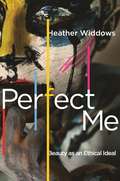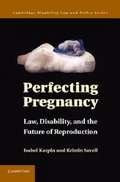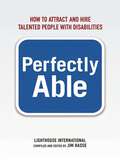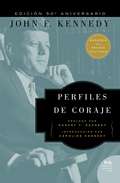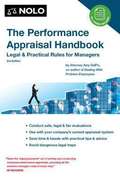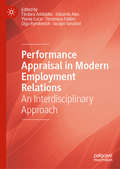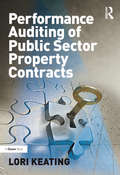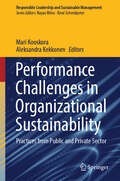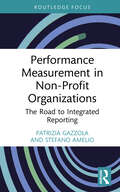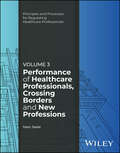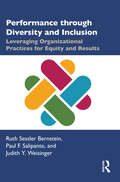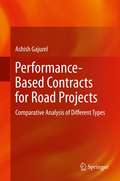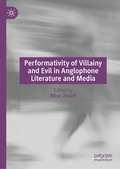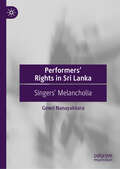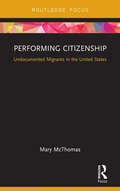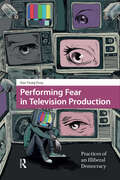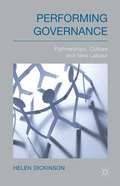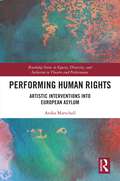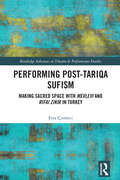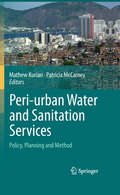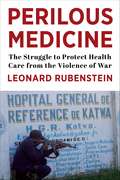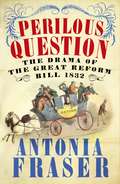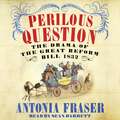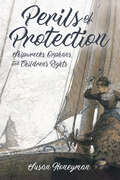- Table View
- List View
Perfect Me: Beauty as an Ethical Ideal
by Heather WiddowsHow looking beautiful has become a moral imperative in today’s worldThe demand to be beautiful is increasingly important in today's visual and virtual culture. Rightly or wrongly, being perfect has become an ethical ideal to live by, and according to which we judge ourselves good or bad, a success or a failure. Perfect Me explores the changing nature of the beauty ideal, showing how it is more dominant, more demanding, and more global than ever before.Heather Widdows argues that our perception of the self is changing. More and more, we locate the self in the body--not just our actual, flawed bodies but our transforming and imagined ones. As this happens, we further embrace the beauty ideal. Nobody is firm enough, thin enough, smooth enough, or buff enough—not without significant effort and cosmetic intervention. And as more demanding practices become the norm, more will be required of us, and the beauty ideal will be harder and harder to resist.If you have ever felt the urge to "make the best of yourself" or worried that you were "letting yourself go," this book explains why. Perfect Me examines how the beauty ideal has come to define how we see ourselves and others and how we structure our daily practices—and how it enthralls us with promises of the good life that are dubious at best. Perfect Me demonstrates that we must first recognize the ethical nature of the beauty ideal if we are ever to address its harms.
Perfecting Pregnancy
by Isabel Karpin Kristin SavellPrenatal and preimplantation testing technologies have offered unprecedented access to information about the genetic and congenital makeup of our prospective progeny. Future developments such as preconception testing, noninvasive prenatal testing, and more extensive preimplantation testing promise to increase that access further still. The result may be greater reproductive choice, but it also increases the burden on women and men to avail themselves of these technologies in order to avoid having a child who has a disability. The overwhelming question for legislators has been whether and, if so, how to regulate the use of these technologies in the face of compelling but seemingly contradictory claims about the advancement of reproductive choice and the dangers of eugenic or discriminatory effects. This book examines the evolution of this legislative oversight across a number of jurisdictions and explores the tensions and ambiguities that inform these laws.
Perfecting Virtue
by Lawrence Jost Julian WuerthIn western philosophy today, the three leading approaches to normative ethics are those of Kantian ethics, virtue ethics and utilitarianism. In recent years the debate between Kantian ethicists and virtue ethicists has assumed an especially prominent position. The twelve newly-commissioned essays in this volume, by leading scholars in both traditions, explore key aspects of each approach as related to the debate, and identify new common ground but also real and lasting differences between these approaches. The volume provides a rich overview of the continuing debate between two powerful forms of enquiry, and will be valuable for a wide range of students and scholars working in these fields.
Perfectly Able: How to Attract and Hire Talented People with Disabilities
by Jim HasseMore than 22 million of the almost 173 million working-age individuals in the United States have one or more disabilities. Perfectly Ableoffers practical guidance for companies large and small on how to hire and retain talented and motivated people from within this largely untapped pool of potential employees. Illustrated with enlightening personal stories, this one-of-a-kind book provides insight into what it's like to seek employment as an individual with a disability. Readers will discover how to: * Evaluate how suited their workplace environment is for disabled or different employees and what needs to be changed * Improve and sustain their workforce by hiring the best people, regardless of any disability or diversity issue * Effectively recruit, place, and develop individuals with disabilities who can contribute to their company's success * Embrace the differences among their workforce to add value to the organization
Perfiles de Coraje
by John F. Kennedy«Este es un libro acerca de la virtud más admirable de todas las virtudes humanas: el valor. Ernest Hemingway la definió como “gracia bajo presión”. Y estos son los relatos sobre las presiones que experimentaron ocho Senadores de Estados Unidos y la gracia con la cual las enfrentaron». —John F. Kennedy Durante los años 1954 y 1955, el entonces Senador de Estados Unidos, John F. Kennedy, escogió a ocho de sus colegas históricos para presentar sus perfiles, destacados por sus actos de impresionante integridad ante una oposición abrumadora. Entre estos héroes se encuentran John Quincy Adams, Daniel Webster, Thomas Hart Benton y Robert A. Taft. Este libro recibió el Premio Pulitzer en 1957, y ha vuelto al mercado en esta nueva edición en español, que incluye una introducción escrita por Caroline Kennedy, además del prólogo para la edición conmemorativa escrito por Robert Kennedy, lanzada en 1964, resuena con lecciones perdurables para todos los tiempos sobre la más apreciada de las virtudes, y es una poderosa remembranza de la fortaleza del espíritu humano. Como afirma Robert Kennedy en el prólogo, este es «no solo un conjunto de historias del pasado, sino también una conexión de esperanza y confianza para el futuro. Lo que suceda en la nación, y en el mundo, depende de lo que nosotros hagamos con lo que otros nos han dejado».
Performance Appraisal Handbook
by Amy Delpo AttorneyEverything you need to conduct legally safe employee evaluations The Performance Appraisal Handbook is a must-read for every manager, whether you're writing a performance review for the first time or the hundredth. It's packed with the information and tools you need to make your company's appraisal process work better for everyone. Find out how to: motivate your staff to perform better help employees develop and grow identify poor performers and help them get on track avoid common legal traps and problems increase employee morale foster good communication safely fire poor performers who fail to improve Written by an employment-law attorney and reviewed by an expert advisory board, this guide provides a unique combination of practical and legal information, plus easy-to-follow steps. You'll also get helpful checklists, sample forms and policies, and audio dialogues. The 2nd edition is completely updated to cover the latest legal developments.
Performance Appraisal in Modern Employment Relations: An Interdisciplinary Approach
by Tindara Addabbo Edoardo Ales Ylenia Curzi Tommaso Fabbri Olga Rymkevich Iacopo SenatoriContributing to the debate on work performance evaluation in a time of technological transformation, this book explores the impact of digitisation on production and organisation models, as well as on the rights and interests of the stakeholders involved. As organisations down-size, merge with other companies and become decentralised, the boundaries in employer-employee-customer relationships are blurred and new models for the organisation and assessment of work performance have emerged. With these new models, innovative regulatory approaches are sorely needed. Taking an interdisciplinary approach and drawing on theoretical concepts from organisation studies, human resource management, sociology and labour economics, this all-encompassing collection is not only essential reading for academics and students, but also for policy-makers and employers who are looking for innovative and practical solutions to the challenges of modern employment relations.
Performance Auditing of Public Sector Property Contracts
by Lori KeatingPPP/PFI contracts often share a number of features: they run over a very long period of time; they are conceived without a complete understanding of how requirements may change and despite the rhetoric they tend to create a context where dispute and litigation rather than partnership are the norm. In this environment, effective auditing is essential to ensure that projects are delivering what the end-user requires. Audits are both a public sector right, and a matter of good management sense. Performance Auditing of Public Sector Property Contracts is a practical guide to performance auditing for public sector property managers with a series of guidelines for auditors of public sector property contracts. The book concentrates on Facilities Management contracts. Lori Keating explains the basis for the process; how to retain balance, independence and rigour and how to audit intangible performance measures and other tricky areas. The book follows an audit process from commencement to conclusion, and contains a discussion of factors that contribute to the success of any audit. It is essential reading for public sector auditors, PPP project managers and contractors.
Performance Challenges in Organizational Sustainability: Practices from Public and Private Sector (Responsible Leadership and Sustainable Management)
by Mari Kooskora Aleksandra KekkonenThis book conceptualizes and clarifies the meaning of sustainable performance, approaching it holistically from different perspectives. It focuses on challenges related to movements to transform the world economy into more modern, resource-efficient, and competitive, while keeping in mind harmonization of environmental, social, and governance objectives. This has brought along new initiatives and undertakings that invite people, communities, and organizations to participate in building greener and more sustainable future. The book discusses the UN Sustainable Development Goals (SDGs), EU Green Deal and Climate Pact, and Environmental, Social and Governance (ESG) metrics. It tackles policies and strategies that integrate sustainable practices into business activities to align with these goals, focusing on the increasing number of regulations, such as ESG Reporting, Sustainable Finance Disclosure Regulation (SFDR), Corporate Sustainability Reporting Directive (CSRD), and Green Taxonomy. The book highlights new challenges organizations will face as they navigate their way through these goals and regulations, and provides practical coping tips. It is divided into four main parts which consecutively discuss and analyze the concepts and approaches more generally in the first part, challenges, approaches, and metrics on green and sustainable performance on regional and local level in the second part; and on companies' level in the third part; and how top-down (public sector) and bottom-up (private sector) approaches meet. Finally, in the fourth part, the book showcases concrete cases and best practices related to the above-described topics showing how the challenges related to green and sustainable performance have been turned to new opportunities and competitive advantage in different organizations in different industries. The book is a valuable resource for not only academia, researchers, master, and doctoral level students (especially in the sustainability courses), and executive trainings, but also practitioners, politicians, public officials, and organizational leaders interested in turning their organizations into more sustainable units.
Performance Measurement in Non-Profit Organizations: The Road to Integrated Reporting (Routledge Focus on Business and Management)
by Patrizia Gazzola Stefano AmelioPerformance Measurement in Non-Profit Organizations: The Road to Integrated Reporting addresses the issue of performance measurement in nonprofit companies with the aim of defining a system of useful measures to understand, manage, and improve the performance of such companies by employing systems theory to examine their conditions of existence and manifestations of life. From the proposed company model follows that the system of performance measures should make it possible to keep under control both the productive transformation, with the physical-technical efficiency indicators, and the economic transformation, with the economic efficiency indicators, and the financial transformation with the financial efficiency indicators, and finally the managerial transformation with the effectiveness indicators, taking into account the degree of satisfaction of the expectations of the main categories of company stakeholders. Readers will understand that economic analysis alone is not sufficient to assess the performance of such organizations, but it is necessary to unite it with the analysis of sustainability dimensions. It would therefore be appropriate to draw up an integrated report that combines the economic and financial dimensions with the pillars of sustainability, as in the case of companies in the second sector. There is a gap in the literature in this area that this book aims to fill, making it a valuable resource to researchers, academics, and advanced students interested in performance evaluation of NPOs.
Performance of Healthcare Professionals, Crossing Borders and New Professions, Volume 3 (Principles and Processes for Regulating Healthcare Professionals)
by Marc SealeA comprehensive and authoritative reference on the principles and processes for regulating healthcare professionals In Performance of Healthcare Professionals, Crossing Borders and New Professions, renowned international regulator Marc Seale delivers an authoritative discussion on the performance of healthcare professionals, including international practice and the regulation of new and evolving disciplines. This comprehensive reference work examines all components of the performance of healthcare professionals, providing clear definitions and analysis lacking in the existing literature on the subject, and offers a practical guide for understanding a complex regulatory landscape. Readers will also find: A thorough introduction tothe performance, underperformance, and the failure of healthcare professionals Comprehensive explorations of concerns and complaints about individual practitioners, fitness to practice, and tribunals Practical discussion of compliance with conditions of practice, rehabilitation, and restoration Review of emigration, crossing borders, and the emergence of new healthcare professions Perfect for the educators and teachers of healthcare students, Performance of Healthcare Professionals, Crossing Borders and New Professions will also benefit healthcare students, consumer advocacy organisations, healthcare employers, professional associations, lawmakers and regulators.
Performance through Diversity and Inclusion: Leveraging Organizational Practices for Equity and Results
by Ruth Sessler Bernstein Paul F. Salipante Judith Y. WeisingerThis book provides practical guidance for managers, leaders, diversity officers, educators, and students to achieve the benefits of diversity by focusing on creating meaningful, inclusive interactions. Implementing inclusive interaction practices, along with accountability practices, enhances performance outcomes for the organization and improves equity for members of historically underrepresented and marginalized groups. The book highlights the need to challenge existing approaches that have overemphasized representational—that is, numerical—diversity. For many decades, the focus has been on this important first step of increasing the numbers of underrepresented groups. However, moving beyond representation toward a truly inclusive organizational culture that produces real performance and equity has been elusive. This book moves the focus from achieving numerical diversity to achieving frequent, high-quality, equitable, and productive interactions that enable individuals to leverage their distinctive talents and provides the steps to do so. The benefits of this approach occur at the individual, workgroup, and organizational levels. Real-life examples of good inclusive practices are provided from across the for-profit, nonprofit, and governmental sectors and in various organizational contexts. The book is ideal not only for those charged with diversity, equity, and inclusion efforts in organizations but also for organizational leaders and managers who can create and/or support the implementing of inclusive organizational practices and also for postgraduate and undergraduate students studying human resource management, organizational behavior, management, or diversity, equity, and inclusion.
Performance-Based Contracts for Road Projects: Comparative Analysis of Different Types
by Ashish GajurelThis book focuses on the aspects of contracting contracts, basically related to road construction and management contracts. The book presents an analytical study of Performance-Based Road Management and Maintenance (PMMR), Funktionsbauvertrag (FBV) (Function-Based Construction Contract) and Public Private Partnerships (PPP). A separate chapter is also included about the comparative study of these contract types. The book provides useful material for university libraries, construction companies and government departments of construction.
Performativity of Villainy and Evil in Anglophone Literature and Media
by Nizar ZouidiPerformativity of Villainy and Evil in Anglophone Literature and Media studies the performative nature of evil characters, acts and emotions across intersecting genres, disciplines and historical eras. This collection brings together scholars and artists with different institutional standings, cultural backgrounds and (inter)disciplinary interests with the aim of energizing the ongoing discussion of the generic and thematic issues related to the representation of villainy and evil in literature and media. The volume covers medieval literature to contemporary literature and also examines important aspects of evil in literature such as social and political identity, the gothic and systemic evil practices. In addition to literature, the book considers examples of villainy in film, TV and media, revealing that performance, performative control and maneuverability are the common characteristics of villains across the different literary and filmic genres and eras studied in the volume.
Performers’ Rights in Sri Lanka: Singers’ Melancholia
by Gowri NanayakkaraThis book explores whether global music copyright law and the performers’ rights regime (PRR) have been able to improve the economic position of artists, as they were originally intended to. The author investigates whether this regime effectively addresses contemporary issues regarding royalty payments and cover songs in Sri Lankan music, drawing on the empirical findings of a case study she conducted on the Sinhala music industry. She finds that the PRR developed internationally and implemented in Sri Lanka is predicated on a particular view of the role of performers and their relationships with other actors in the music industry; although this view can be found in the USA, UK and India, it does not seem to reflect the established practices and relationships within Sri Lanka’s contemporary music industry. While providing a socio-historical and legal analysis of these differing industrial settings and investigating the manner in which they impact the PRR’s (in)ability to deliver improved economic security for Sinhala singers, the book also offers policymakers recommendations on how to supplement current national copyright law and the PRR in order to provide a secure economic position for music artists in Sri Lanka.
Performing Citizenship: Undocumented Migrants in the United States
by Mary McThomasUndocumented migrants in the United States raise compelling questions about political legitimacy, obligation, and citizenship. If they are truly members of their communities, should they have a voice in the laws and policies that impact their lives? Should their interests be considered, especially in light of exploitation by employers, the possibility of detention and the threat of deportation? This book argues that we do indeed owe certain moral and political obligations to those individuals who have been living and contributing to their communities, regardless of whether they initially arrived without documents. McThomas' argument is based on flipping the way we think about political obligation and state-granted citizenship. Instead of the conventional understanding that the conferral of rights by the state obligates citizens to perform certain duties, she argues that the performance of civic duties and obligations – "performing citizenship" – should trigger corresponding rights and protections. The book combines theory and practice to make this argument, analyzing state-level legislative debates about extending driving privileges and in-state tuition rates to undocumented residents. Consistent with the book’s main argument, we see contested notions of what constitutes citizenship in these debates and a growing acknowledgment that those who perform citizenship deserve certain rights and privileges.
Performing Fear in Television Production: Practices of an Illiberal Democracy (Asian Visual Cultures)
by Siao Yuong FongWhat goes into the ideological sustenance of an illiberal capitalist democracy? While much of the critical discussion of the media in authoritarian contexts focus on state power, the emphasis on strong states tend to perpetuate misnomers about the media as mere tools of the state and sustain myths about their absolute power. Turning to the lived everyday of media producers in Singapore, this book poses a series of questions that explore what it takes to perpetuate authoritarian resilience in the mass media. How, in what terms and through what means, does a politically stable illiberal Asian state like Singapore formulate its dominant imaginary of social order? What are the television production practices that perform and instantiate the social imaginary, and who are the audiences that are conjured and performed in the process? What are the roles played by imagined audiences in sustaining authoritarian resilience in the media? As argued in the book, if audiences function as the central problematic that engenders anxieties and self-policing amongst producers, can the audience become a surrogate for the authoritarian state?
Performing Governance
by Helen DickinsonPerforming Governance sets out a new framework to assess the performance of partnerships and examines what these actually deliver. This is applied to three areas of New Labour's welfare policy; child safeguarding, urban regeneration and the modernisation of health and social care. This book contributes to understanding governance under New Labour.
Performing Human Rights: Artistic Interventions into European Asylum (Routledge Series in Equity, Diversity, and Inclusion in Theatre and Performance)
by Anika MarschallThis book enhances critical perspectives on human rights through the lens of performance studies and argues that contemporary artistic interventions can contribute to our understanding of human rights as a critical and embodied doing. This study is situated in the contemporary discourse of asylum and political art practices. It argues for the need to reimagine human rights as performative and embodied forms of recognition and practical honouring of our shared vulnerability and co-dependency. It contributes to the debate of theatre and migration, by understanding that contemporary asylum issues are complex and context specific, and that they do not only pertain to the refugee, migrant, asylum seeker or stateless person but also to privileged constituencies, institutional structures, forms of organisation and assembly. The book presents a unique mixed-methods approach that focuses equally on performance analyses and on political philosophy, critical legal studies and art history – and thus speaks to a range of politically interested scholars in all four fields.
Performing Post-Tariqa Sufism: Making Sacred Space with Mevlevi and Rifai Zikir in Turkey (Routledge Advances in Theatre & Performance Studies)
by Esra ÇizmeciThis ethnographic research project examines the generation of post-tariqa Tasavvuf (Sufism: a spiritual practice and philosophy recognised as the inner dimension of Islam) in a variety of private, semi-public, public, secular and sacred urban spaces in present-day Turkey. Through extensive field research in minority Sufi communities, this book investigates how devotees of specific orders maintain, adapt, mobilise, and empower their beliefs and values through embodied acts of their Sufi followers. Using an ethnographic methodology and theories derived from performance studies, Esra Çizmeci examines the multiple ways in which the post-tariqa Mevlevi and Rifai practice is formed in present-day Turkey, such as through the authority of the spiritual teacher; the individual and collective performance of Sufi rituals; nefs (self) training; and, most importantly, the practice of Sufi doctrines in everyday life through the production of sacred spaces. Drawing on the theories of performance, she examines how the Sufi way of living and spaces are created anew in the process of each devotee’s embodied action. This book is informed by theories in performance studies, anthropology, religious studies, and cultural studies and places current Sufi practices in a historical perspective.
Peri-urban Water and Sanitation Services
by Mathew Kurian Patricia MccarneyMore than 2.6 billion people in the developing world lack access to safe water and sanitation service. The Millennium Development Goal's (MDG) target is to halve the number of people without access to a sustainable source of water supply and connection to a sewer network by 2015. That target is unlikely to be met. If there is anything that can be learnt from European experience it is that institutional reform occurs incrementally when politically enfranchised urban populations perceive a threat to their material well-being due to contamination of water sources.
Perilous Medicine: The Struggle to Protect Health Care from the Violence of War
by Leonard RubensteinPervasive violence against hospitals, patients, doctors, and other health workers has become a horrifically common feature of modern war. These relentless attacks destroy lives and the capacity of health systems to tend to those in need. Inaction to stop this violence undermines long-standing values and laws designed to ensure that sick and wounded people receive care.Leonard Rubenstein—a human rights lawyer who has investigated atrocities against health workers around the world—offers a gripping and powerful account of the dangers health workers face during conflict and the legal, political, and moral struggle to protect them. In a dozen case studies, he shares the stories of people who have been attacked while seeking to serve patients under dire circumstances including health workers hiding from soldiers in the forests of eastern Myanmar as they seek to serve oppressed ethnic communities, surgeons in Syria operating as their hospitals are bombed, and Afghan hospital staff attacked by the Taliban as well as government and foreign forces. Rubenstein reveals how political and military leaders evade their legal obligations to protect health care in war, punish doctors and nurses for adhering to their responsibilities to provide care to all in need, and fail to hold perpetrators to account.Bringing together extensive research, firsthand experience, and compelling personal stories, Perilous Medicine also offers a path forward, detailing the lessons the international community needs to learn to protect people already suffering in war and those on the front lines of health care in conflict-ridden places around the world.
Perilous Question: The Drama of the Great Reform Bill 1832
by Lady Antonia FraserThe two-year revolution that totally changed how Britain is governed.Internationally bestselling historian Antonia Fraser's new book brilliantly evokes one year of pre-Victorian political and social history - the passing of the Great Reform Bill of 1832, an eventful and violent year that featured riots in Bristol, Manchester and Nottingham.The time-span of the book is from Wellington's intractable declaration in November 1830 that 'The beginning of reform is beginning of revolution' to 7 June 1832, when William IV reluctantly assented to the Great Reform Bill, under the double threat of the creation of 60 new peers in the House of Lords and the threat of revolution throughout the country. Wider themes of Irish and 'negro emancipation' underscore the narrative.The book is character driven; we learn of the Whig aristocrats prepared to whittle away their own power to bring liberty to the country, the all-too-conservative opposition who included the intransigent Duchess of Kent and Queen Adelaide and finally the 'revolutionaries' like William Cobbett, author of Rural Rides.These events led to a total change in the way Britain was governed, a two-year revolution that Antonia Fraser brings to vivid dramatic life.
Perilous Question: The Drama of the Great Reform Bill 1832
by Lady Antonia FraserInternationally bestselling historian Antonia Fraser's new book brilliantly evokes one year of pre-Victorian political and social history - the passing of the Great Reform Bill of 1832. For our inconclusive times, there is an attractive resonance with 1832, with its "rotten boroughs" of Old Sarum and the disappearing village of Dunwich, and its lines of most resistance to reform. This book is character-driven - on the one hand, the reforming heroes are the Whig aristocrats Lord Grey, Lord Althorp and Lord John Russell, and the Irish orator Daniel O'Connell. They included members of the richest and most landed Cabinet in history, yet they were determined to bring liberty, which whittled away their own power, to the country. The all-too-conservative opposition comprised Lord Londonderry, the Duke of Wellington, the intransigent Duchess of Kent and the consort of the Tory King William IV, Queen Adelaide. Finally, there were "revolutionaries" and reformers, like William Cobbett, the author of "Rural Rides".This is a book that features one eventful year, much of it violent. There were riots in Bristol, Manchester and Nottingham, and wider themes of Irish and "negro emancipation" underscore the narrative. The time-span of the book is from Wellington's intractable declaration in November 1830 that 'The beginning of reform is the beginning of revolution', to 7th June 1832, the date of the extremely reluctant royal assent by William IV to the Great Reform Bill, under the double threat of the creation of 60 new peers in the House of Lords and the threat of revolution throughout the country. These events led to a total change in the way Britain was governed, a two-year revolution that Antonia Fraser brings to vivid dramatic life.Read by Sean Barrett. Sean Barrett has narrated many television documentaries for the BBC and Discovery Channel, notably THE PEOPLE'S CENTURY, WALKING WITH BEASTS, and GREAT LIVES. As a member of the BBC Radio Rep, he has appeared in hundreds of radio plays, and played Father Gillespie in the BBC Worldservice / BBC7 serial WESTWAY throughout its eight year-run. As a film and television actor he has appeared in pieces as diverse as TWELFTH NIGHT and FATHER TED, and he is a doyen of audiobook reading, with acclaimed recordings of authors ranging from Chaucer to Beckett and in 2012 recorded Antony Beevor's THE SECOND WORLD WAR.(p) 2013 Orion Publishing Group
Perils of Protection: Shipwrecks, Orphans, and Children's Rights (Children's Literature Association Series)
by Susan HoneymanWinner of the Children’s Literature Association’s 2020 Honor Book AwardUnrecognized in the United States and resisted in many wealthy, industrialized nations, children’s rights to participation and self-determination are easily disregarded in the name of protection. In literature, the needs of children are often obscured by protectionist narratives, which redirect attention to parents by mythologizing the supposed innocence, victimization, and vulnerability of children rather than potential agency.In Perils of Protection: Shipwrecks, Orphans, and Children's Rights, author Susan Honeyman traces how the best of intentions to protect children can nonetheless hurt them when leaving them unprepared to act on their own behalf. Honeyman utilizes literary parallels and discursive analysis to highlight the unchecked protectionism that has left minors increasingly isolated in dwindling social units and vulnerable to multiple injustices made possible by eroded or unrecognized participatory rights.Each chapter centers on a perilous pattern in a different context: “women and children first” rescue hierarchies, geographic restriction, abandonment, censorship, and illness. Analysis from adventures real and fictionalized will offer the reader high jinx and heroism at sea, the rush of risk, finding new families, resisting censorship through discovering shared political identity, and breaking the pretenses of sentimentality.
